![]()
What image does the word “archaeologist” bring to mind? An aged professor proving over dusty volumes of technical notes? Or Indiana Jones, sweeping through an ancient temple to uncover a lost relic? The truth is, real-life archaeologists are a little of both: intrepid adventurers and technical researchers. They work with shovels and picks, as well as drones and 3D modeling software. They engage in scholarly debate and in public outreach. In short, archaeologists have highly varied and highly interesting work.
People have always been interested in the past. But for 99% of human history, no writing systems existed to record events and ideas. And even after the invention of writing, only certain types of events (such as the lives of rulers) were recorded, and, of these, only some texts have survived. In order to understand what events took place and how people lived in the past, scholars have turned to physical materials. From household rubbish heaps, to temples, from stone age tools to civil war cannons, artifacts tell the story of humankind, and archaeologists know how to understand what these items were, how they were used, and what they tell us about the people who made them.
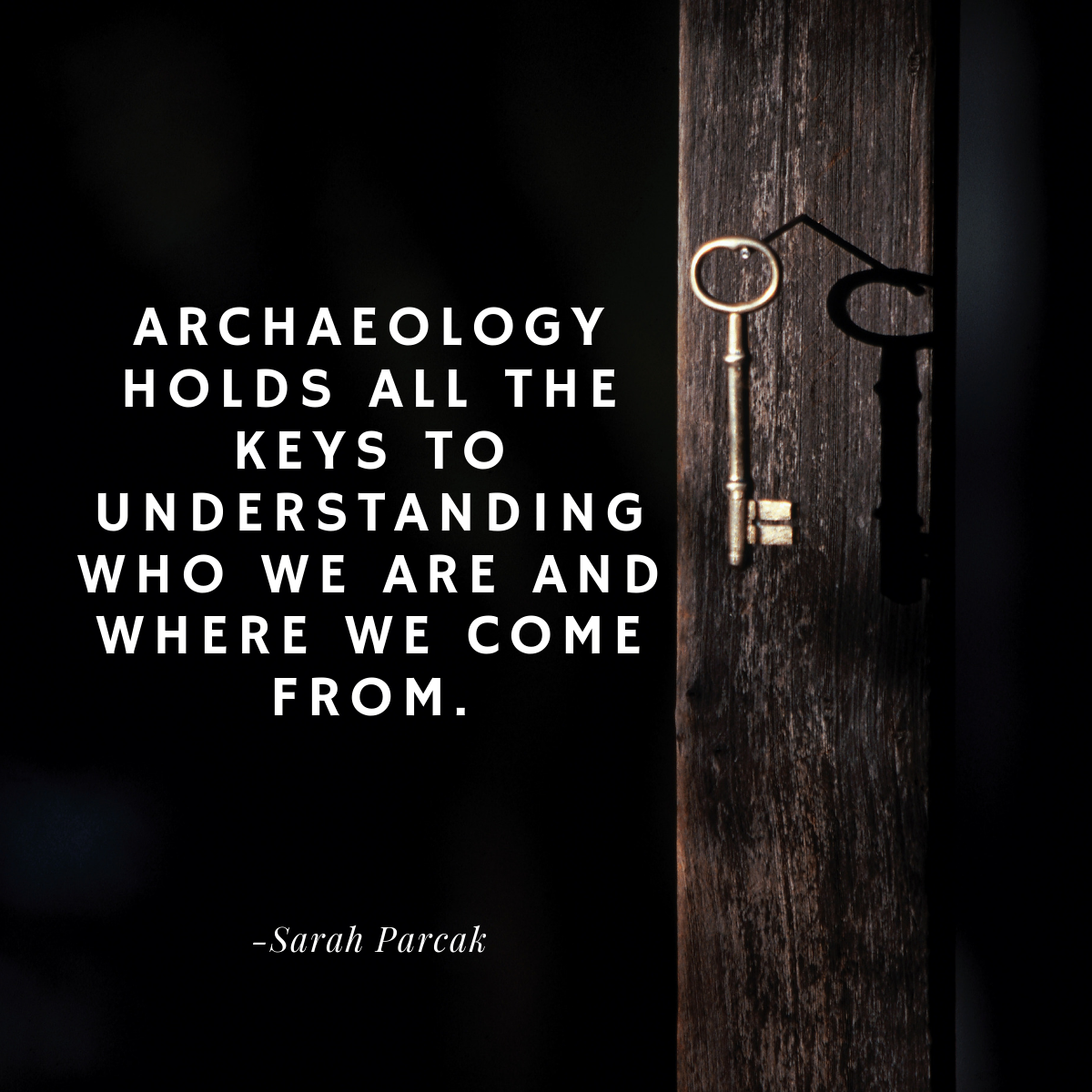
Archaeologists have patience, dedication, focus, logic, analytical skills, and lots of natural curiosity. If you have the right disposition and an intense interest in the past, you may be curious about degrees and careers in archaeology. An estimated 91,776 people hold degrees in archaeology, from a bachelor’s to a PhD. But a degree in archaeology isn’t the right fit for every person, or every career path. Wondering if a career studying the past is in your future? Explore our guide to What Can I Do with an Archaeology Degree?
Jump To:
- What is Archaeology?
- What Types of Archaeology Are There?
- What Classes Will I take for a Degree in Archaeology?
- What Can I do with a Bachelor’s in Archaeology?
- What Can I do with a Master’s in Archaeology?
- What Can I do with a PhD in Archaeology?
- Can I Earn a Degree in Archaeology Online?
- What Jobs Can I Get with a Degree in Archaeology?
- What are the Pros and Cons of a Degree in Archaeology?
What is Archaeology?
Archaeology literally means “the study of that which is ancient,” and is defined as the scientific study of historic and prehistoric peoples, societies, and cultures. It is accomplished by excavating and analyzing artifacts and studying related locations, monuments, inscriptions, and biological remains. Archaeologists study the earliest humans, such as the stone tools of cave-dwelling hunter-gatherers from one million years ago. But they also study artifacts from modern times, such as the discarded household objects recovered from an early 20th century tenement building.
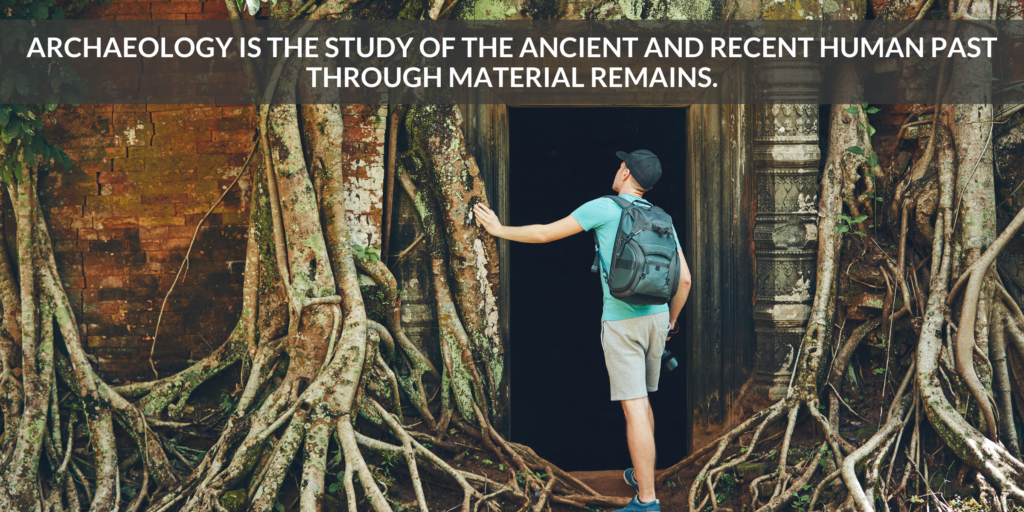
Archeology covers the study of people around the world and throughout the course of human history, with the common thread being a focus on the study of physical materials. Archaeology aims to determine what a given object was, when it came into being, how it was used, and what purpose or effects it had. The goal of archaeology is to develop a comprehensive and inclusive understanding of human culture.
People have always been curious about the past, and especially intrigued by exotic and mysterious monuments and relics. Antiquarianism, the study of history as it related to objects from the distant past, dates back to what we would now consider ancient times. Ancient Romans like the Augustan historian Livy studied and cataloged monuments and artworks from the past. Ancient Chinese scholars such as the Song Dynasty scholar Ouyang Xiu collected and analyzed early Chinese relics. With the excavation of sites like Stonehenge and Pompeii in the 1600s and 1700s, archeology began to evolve as a distinct field. By the 1800s, people had developed clear archeological practices and methods, such as dating objects based on their placement within layers of sediment. Rather than simply collecting beautiful and exotic antiquities, archeologists began to systematically gather and catalog artifacts for the purpose of building knowledge. Today, archaeology is concerned with the same quest for historical knowledge, but informed by a broader cultural understanding, and aided by high-tech tools like 3D modeling, drones, and photogrammetry.
Although it has been around for quite some time, there’s still no clear consensus on how to classify this heavily interdisciplinary field. As an academic discipline, archaeology can be difficult to pigeonhole. Depending on which expert you ask, this subject is either a highly scientific branch or the humanities, or else a highly humanistic branch of the social sciences. In fact, archaeology can be considered as both a part of the social sciences or the humanities. In the United States, Archaeology is conceived as a branch of anthropology in the United States, but in Europe, it is considered to be a branch of History or treated as a discipline in its own right.
Under the broader heading of humanities/social sciences, archaeology is usually seen as a branch of anthropology. Anthropologists study human culture and society, often those of the ancient past or far-flung locations. The field has several branches, such as Biological Anthropology, the study of human remains as they relate to people’s lifestyles and lives. And while many anthropologists study fossils, relics, dwellings, and inscriptions, archaeologists are unique in their particular focus on humans’ physical materials.
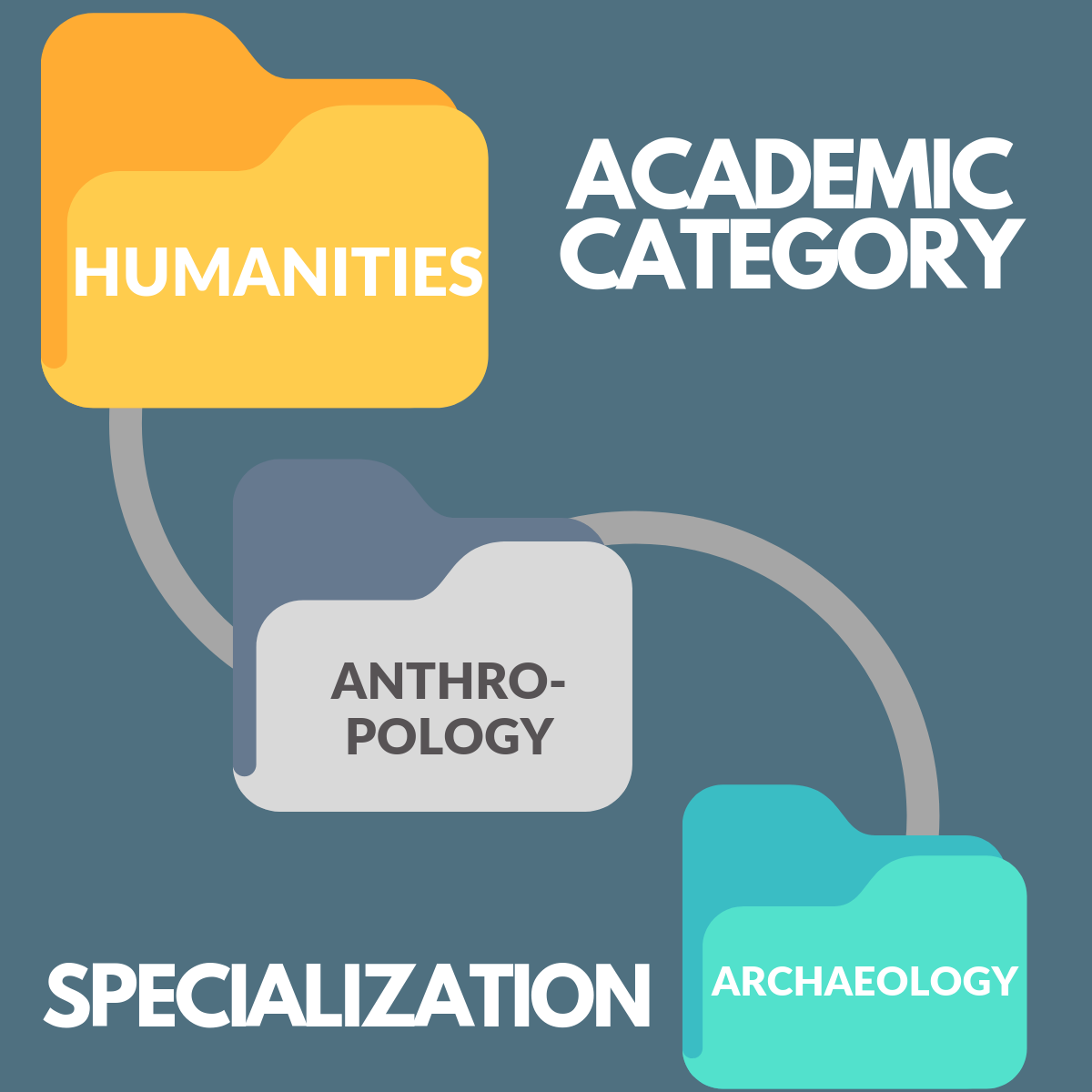
What Types of Archaeology Are There?
There are many specializations within archaeology, and no universal consensus on what makes up the main fields. Some archaeologists classify themselves based on the historical period or geographical location of their interest, such as Mesoamerica, Egyptology, or Classical Antiquity. Others may specialize in a particular type of relic, such as human remains (bioarchaeology), animals or plants (zooarchaeology or paleoethnobotany), or stone tools (lithics). Archaeologists may also specialize in particular practices, such as underwater archaeology (the study of submerged human remains and relics). Broadly speaking, archaeology can be divided into the sub-disciplines of Cultural resources management, Archaeometry, Historical archeology, Ethnoarchaeology, and Experimental archaeology. These fields are not entirely distinct, of course- for instance, many archaeologists conduct Cultural resources management as well as Historical archaeology.
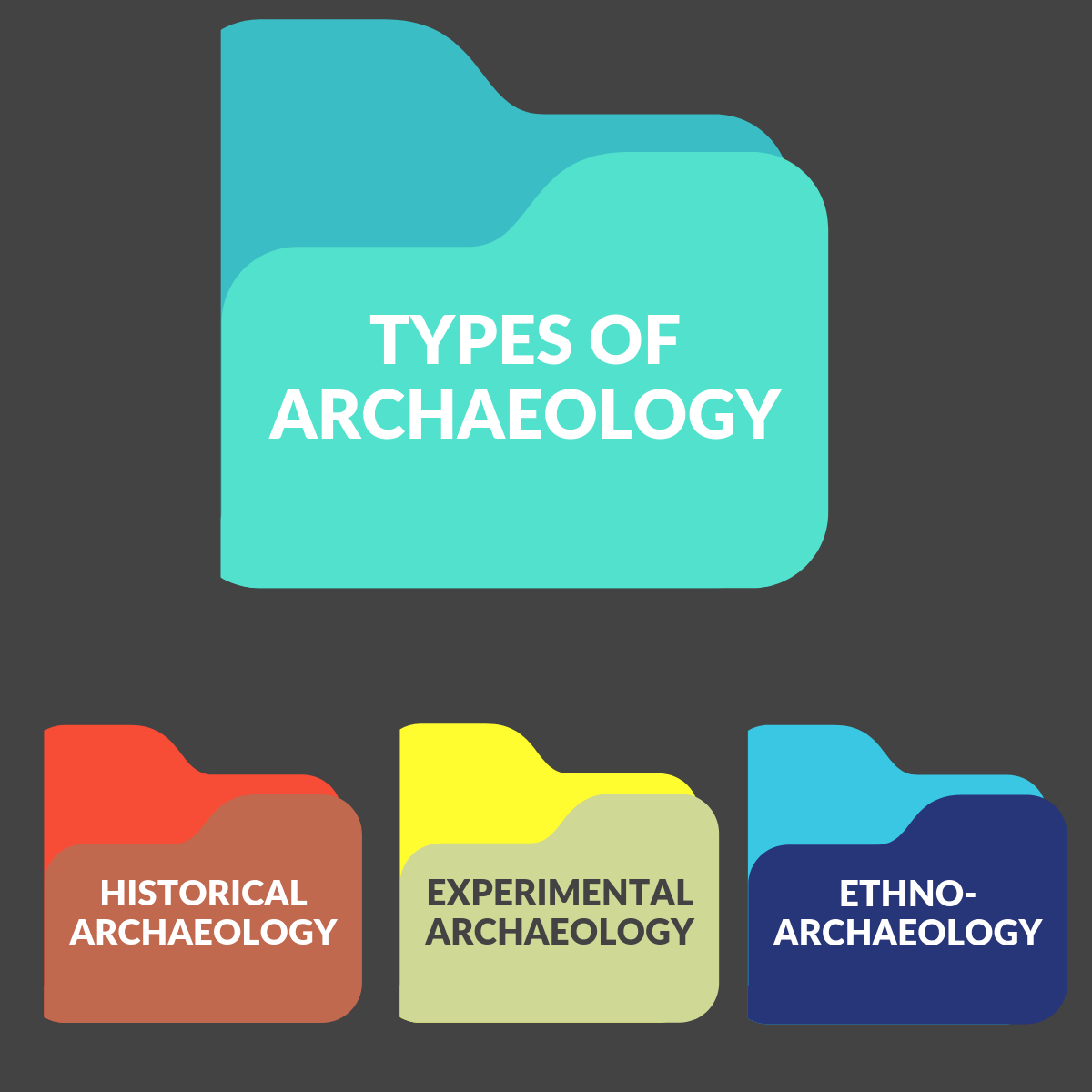
Cultural resources management
Just as human activity takes a toll on natural resources, activities like development, travel, mining, warfare, climate change and looting take a toll on the sites that archaeologists want preserved. That includes established monuments, dig sites, and locations for potential future exploration. Cultural resources management (CRM) involves protecting archaeological sites from damage. And while preserving archeological sites may not be the first type of activity that comes to mind, CRM actually makes up most of the archaeological research conducted in the US and western Europe. There are plenty of federal and international laws governing how excavations need to be conducted, as well as tourism of historical sites and construction in or around areas that may have historical materials present. Cultural resources management requires a thorough knowledge of these laws and their application.
Archaeometry
From a fossil tooth to a stone temple, artifacts are physical objects with physical qualities that give information about the past. In order to understand this information, their physical properties mulct be accurately measured, described, and recorded. Archaeometry is the systematic measurement of objects, environments, and features that are important to archeology. It includes analytical techniques that include chemistry, physics, and engineering. These include methods like space syntax techniques, carbon dating, geodesy, and computer modeling and tools like geographic information systems.
Historical archaeology
The advent of writing marks the division between pre-history and history. Historical archaeology is focused on the study of cultures that had some form of writing. This can mean periods as recent as the 20th century or as early as 3,000 BC. This is perhaps the best-known type of archeology, and includes examples such as studying Victorian-era shipwrecks, Mayan temples, medieval villages, and American Civil War forts.
Ethnoarchaeology
Ethnography is the systematic study of societies and cultures, as observed from the point of view of a member of that society. Ethnoarchaeology is the application of Ethnography to the study of ancient peoples and cultures. While it’s possible to observe, measure, and catalog artifacts, it can be difficult to understand how these objects were constructed and used without entering into speculation. Ethnoarchaeology is the practice of systematic methods to determine how an ancient relic was created and used within the context of its society. Often, that can mean looking at contemporary modern societies that use similar items under similar environmental circumstances, making inferences about ancient societies that probably followed similar patterns. For example, an Ethnoarchaeologist might look at how modern peoples that fish for food using hand-woven nets in order to better understand how an ancient society might have done so.
Experimental Archaeology
Scientists formulate hypotheses, test them, and draw conclusions that can be repeatedly tested. Experimental archaeology is simply the application of this established experimental method to questions related to archeology. One of the most common forms of experimental archaeology is reconstruction archaeology. In reconstruction archaeology, an archaeologist attempts to create a structure or object identical to one that would have existed in an ancient society using only the materials and technology of that time period. For instance, an experimental archaeologist might crack open nuts using handmade stone tools in order to see if this caused scrapes on the tools similar to those found on real artifacts.
What Classes Will I take for a Degree in Archaeology?
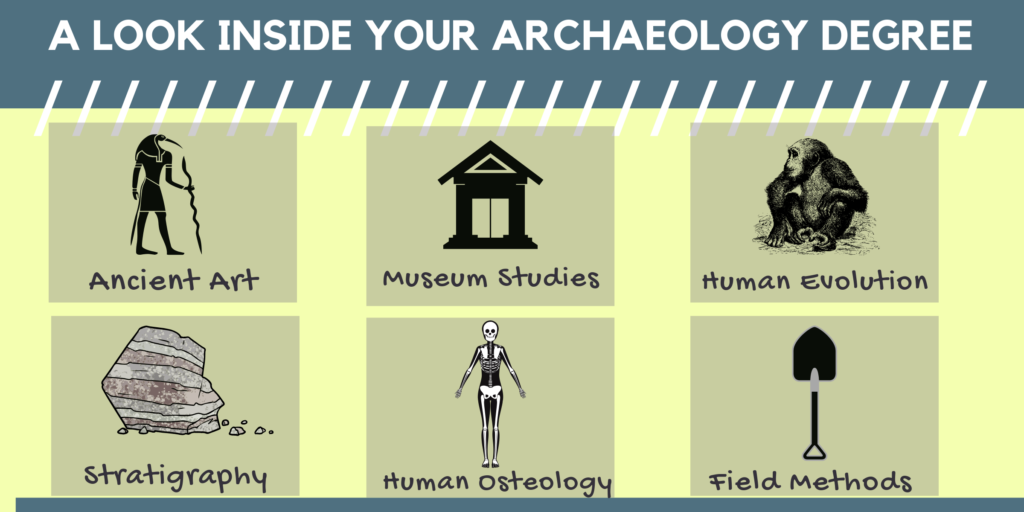
For an Archaeology degree, you can expect to dabble in quite a few very different subjects, including the humanities, math, science. anthropology, art history, classics, world history, and foreign language. This broad, interdisciplinary curriculum will give you a context for understanding archeology before you ever get into archeology-specific classes. Required classes outside of the discipline archeology itself typically include:
- Calculus
- Probability and Statistics
- Applied Economics
- Biology
- Geology
In addition to math and science, you’ll likely need to take courses in history, politics, psychology and language, in order to have a broader context for understanding topics in Archaeology. Your classes in Archaeology itself may include titles like:
- Archaeology and World Prehistory
- Archaeological Theory and Interpretation
- Advanced Studies in Archaeology
- Biological Anthropology
- Foundations of Earth Sciences
- Ancient Art and Art History
- Museum Studies
- Environmental Archaeology
- Classical Civilization
- Sedimentology and Stratigraphy
- Human Osteology
- Cross Cultural Perspectives
- Measurement and Quantification in Social Sciences
- World Archaeology
- Human Evolution
- Field Methods in Archaeology
What Can I do with a Bachelor’s in Archaeology?
A bachelor’s degree is the first step on the road to a future in archaeology.
This undergraduate degree can be found as either a BS (bachelor of science) or a BA (bachelor of arts), and some colleges offer both types of degrees. Essentially, a BS has a stronger emphasis on the technical aspects of archaeology, while a BA incorporates more humanities and focuses on applied skills. Many schools offer a bachelor’s in anthropology with a concentration in archaeology, while others award bachelor’s in archeology with the potential to further specialize in a specific areas, such as MesoAmerican studies.
Students must traditionally work for four years on a full-time basis to earn a bachelor’s degree. If you take courses part-time, of course, your degree will take longer to earn, while an accelerated bachelor’s degree can be earned in about three years. Every degree program is different, but most consist of around 120 credits, or 40 courses. Your coursework will include classes in archaeology as well as hands-on learning, and a large number of required general education classes. The purpose of general education courses is to develop a well-rounded knowledge about the world and a context for understanding topics in your major.
A typical bachelor’s degree curriculum may include:
- Archaeology classes
- General education classes
- A foreign language
- Study abroad
- Labs and fieldwork
- Senior project
In completing a bachelor’s in archaeology, you’ll develop skills in analysis, computation, technology, methodology, and archeology theory. These are transferrable skills that can help you succeed in a variety of settings, such as education, administration, and activism. Transitioning to a non-archaeology field will require you to demonstrate to employers that you can apply your skills in a new role, however, and you may need additional experience or training to take on work outside the field. If you wish to work in the field of archaeology, however, your options with a bachelor’s degree will be limited to roles like assisting in laboratory work or excavation. In order to work as an archaeologist, you’ll need to earn at least a master’s in archaeology.
What Can I do with a Master’s in Archaeology?
To get a master’s in archaeology, you’ll need to have a bachelors in archaeology, or in a related field like anthropology, classical studies, or art history. A master’s usually takes two years to earn on a full-time basis, though an Accelerated Master’s Degree Program can be completed in just 18 months, while a part-time program takes longer.
A master’s in archaeology will focus on the archaeology major, and will not have not general education classes, though you will be required to demonstrate reading proficiency in a foreign language for most. In addition to archaeology classes, you’ll complete extensive hands-on learning through lab work and fieldwork. Many schools offer (or require) international studies as part of their archaeology program. You’ll also be required to complete a research-based thesis or project in your second year. In addition, many schools require students to complete a comprehensive examination before graduating.
If you’d like to specialize in a particular area, many schools offer archaeology concentrations, such as:
- Applied Anthropology
- Ecological Anthropology
- Medical Anthropology
- History and Social Memory
- Prehistoric Archaeology
- Land, Culture and Society
You may also want to consider a minor in a related field, such as a foreign language, gender studies, sociology, history, or geology. A minor can enhance your specialization within the field of archaeology. Alternatively, a minor can broaden your expertise and make it easier to find work outside the field of archaeology instruction and research.
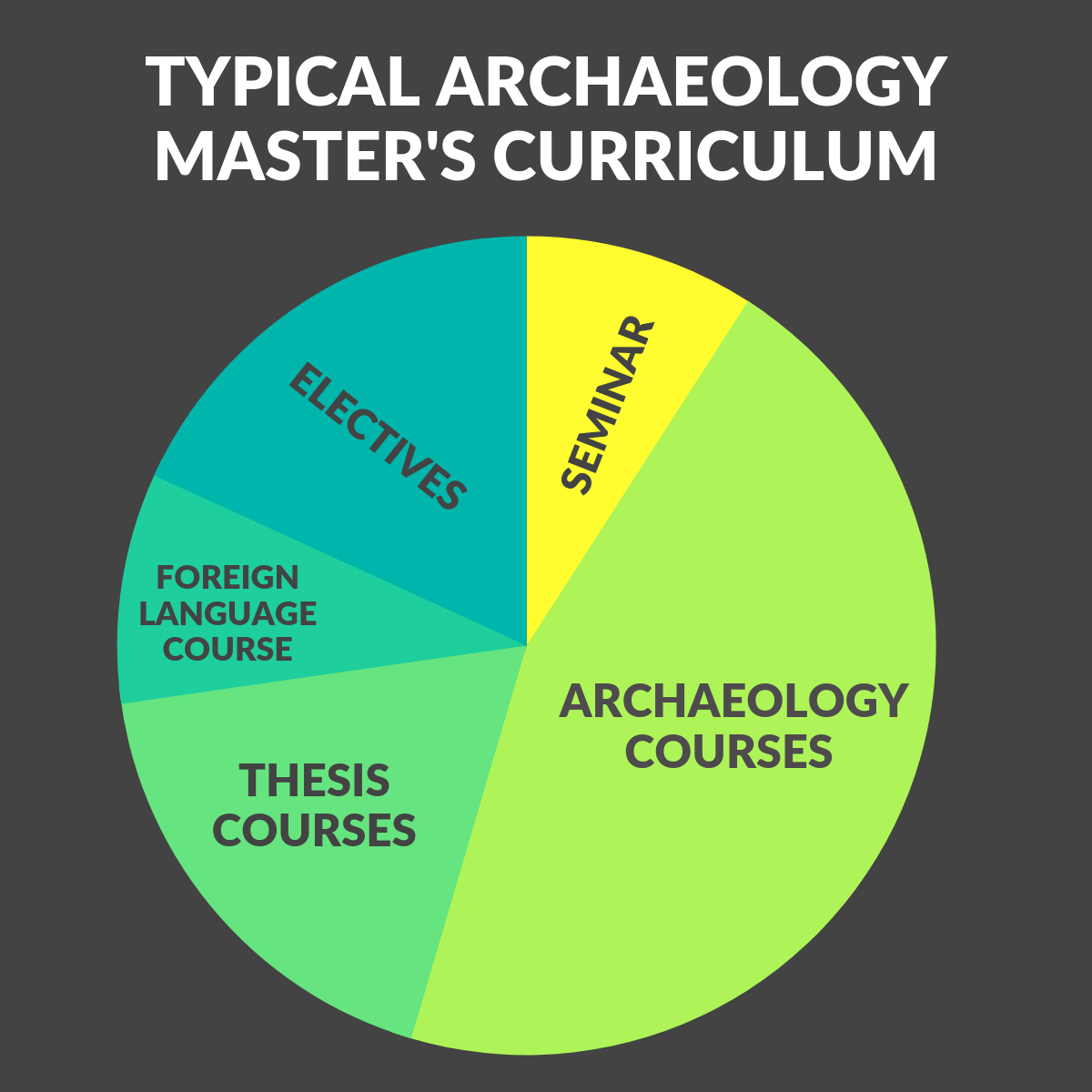
With a master’s in archaeology, you’ll be able to find work in the archaeology field, such as cultural resource management, education, fieldwork, outreach, historic preservation, or museum curation. However, the Bureau of Labor Statistics notes that many positions require a PhD in archaeology, especially those involving research and international studies.
What Can I do with a PhD in Archaeology?
A PhD is a “terminal degree”- the highest degree offered in the field of Archaeology. With this degree, you’ll be an expert in your field, and qualified for research and teaching positions. But earning a PhD is a long and difficult process; it takes 4-9 years to earn a PhD, and many students drop out before completing this rigorous process. In order to earn a PhD in anthropology, you’ll need to complete new research in a specific niche area of anthropology. Under the direction of a thesis advisor, you’ll formulate an original research question, conduct painstaking research, and literally “write the book” on your area of focus by drafting, publishing, and defending your doctoral thesis.
With a PhD in Archaeology, you’ll be qualified to work as an academic archaeologist, project archaeologist, principal investigator, CRM manager, or State Historical Preservation Officer. These are leadership positions, and will allow you to lead and train junior colleagues and students, and to research your own areas of interest. And with a PhD in archaeology, you’ll meet the legal requirements which, in many cases, stipulate that archaeologists working abroad much hold a PhD in archaeology.
Can I Earn a Degree in Archaeology Online?
Archaeology is a latecomer to the field of online education, but there are now a few schools offering online degrees in archaeology. Most students who opt to earn an online degree do so in order to maintain employment or continue to meet family obligations while working towards a degree on a part-time basis. Online education saves busy students from spending time on a commute, and also allows them to access much of their course content on demand. In the case of an online archaeology degree, geographic availability is another important factor. Many areas don’t have a school with a strong archaeology department available locally, and students in this situation may opt to enroll in a well-established archaeology program offered through a school’s online campus. Leading schools such as Harvard offer prestigious online archaeology degrees, while smaller schools may have less “brand recognition” but offer more affordable tuition.
In general, most nine archaeology degree programs do require some degree of on-site participation. This is because archaeology is such a hands-on field, and students can best learn how to conduct a real-life excavation, examination, and measurement procedure by actually observing and participating in real life. This live, interactive learning experience can take the form of an on-campus immersion, on-site field work in a lab or dig site, or a study abroad experience.
What Jobs Can I Get with a Degree in Archaeology?
Your work with an archaeology degree will depend greatly on the degree level you achieve and your preference for applied or academic archaeology. Academic archaeology jobs are those most people associate with the term “archaeology”: professors and researchers. These individuals typically work in a university or museum and conduct field or lab-based research, and hold a PhD in archaeology.
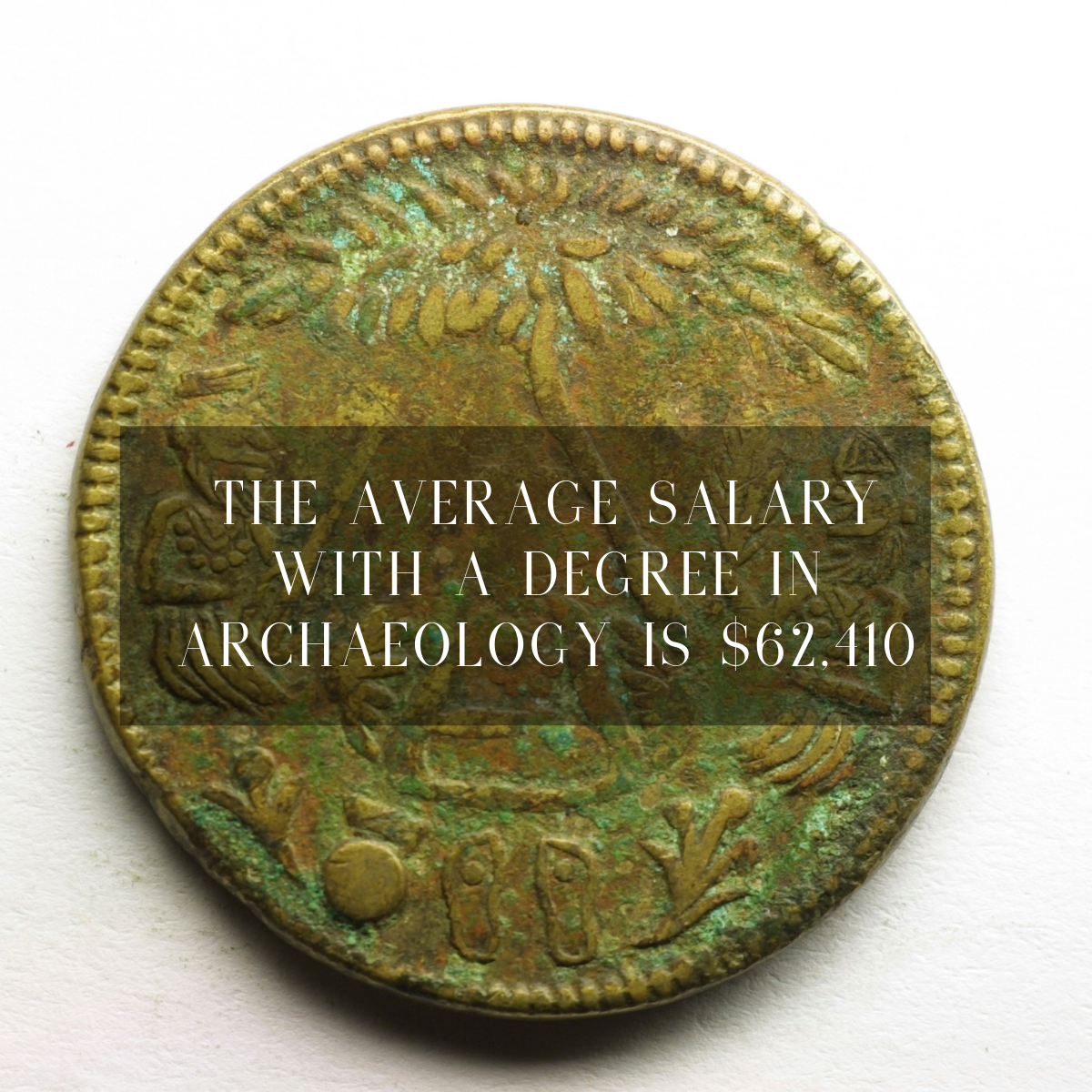
Most archeology work is conducted with cultural resource management (CRM) firms, which execute archaeological investigations associated with federal and private construction projects. Federal law requires that surveys and (where indicated) excavations take place where land is to be disturbed for construction projects, and CRM firms make sure that development does not come at the cost of archeological finds. Applied archaeology positions include roles at museums, national parks, tourism bureaus, federal and state governments, and historical societies.
Archaeologists tend to work in a variety of settings, reading and writing research papers, cataloging and measuring materials in the lab, excavating artifacts at dig sites, viewing materials in museums and libraries, and visiting historic locations around the country or globe. While this is an exceptionally interesting and varied role, archaeology isn’t known to be a lucrative field. Fortunately, it’s not far behind the national average, either. According to the Bureau of Labor Statistics (BLS), the average salary with a degree in archaeology is $62,410. Most archaeologists hold a master’s degree, and the average income associated with a master’s is $68,000 according to the BLS.
The BLS also reports that jobs in archaeology will grow 4% between 2016 and 2026. This is slower than the national average, as there are more people with degrees in archaeology than available positions. But as with salary, the news isn’t too bad. Job growth of between 5-9% is considered “average” by the BLS, meaning that a rate of 4% for the filed of archaeology isn’t lagging too far behind the national average.
What are the Pros and Cons of a Degree in Archaeology?
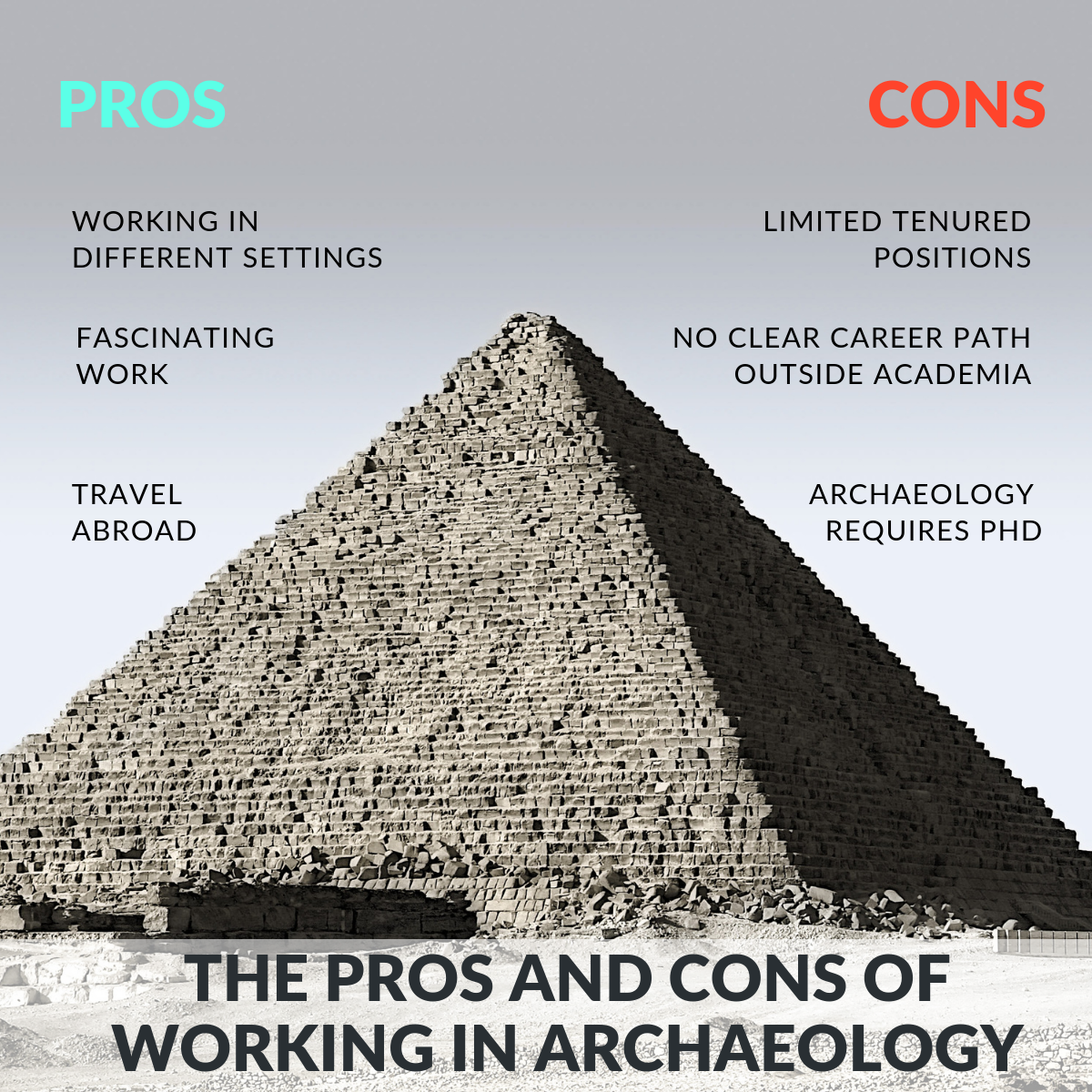
Why get a degree in archaeology? For most students, the answer is simple: they want to. That is, they’ve been interested in the field from a young age, and simply enjoy being involved in anything related to exploring the past. Archaeologists tend to be passionate about their work, and their dedication and excitement about their area of specialty allows them to persist in spite of the field’s challenges.
The main drawbacks of an archaeology degree are a modest salary and competition for jobs. There are fewer archaeology positions than qualified candidates, and many people with archaeology degrees have to spend a great deal of time working in a related field, such as foreign language instruction, or working in a role for which they are overqualified while waiting for the right position to open up. This is especially true for those who want a job in academia. Tenure-track professorships in archaeology simply don’t open up frequently, and those seeking these roles should be willing to relocate for work. Salaries in the field are also modest, which can pose a problem for those who have taken out loans or used their savings to pursue an advanced degree.
On the plus side, archaeology is, simply put, a fascinating field. Few jobs offer the potential to make new discoveries, explore real-life mysteries, and travel to exotic locations. Archaeology offers all these things, as well as the potential to contribute to mankind’s body of knowledge and deepen our understanding of our past, ourselves, and one another.
Further Reading:
- What degree do I need to become an Archaeologist?
- Top 10 Highest Paying Social Science Careers
- What Can I do with a Liberal Arts Degree?
- Top 15 Liberal Arts Schools in America
- Top 10 Highest Paying Social Science Careers
- 50 Best Online Degrees for 2019
- 20 Best Degree Programs for Undergraduates
- 23 Fastest Online Bachelor’s Degree Programs
- Top 25 Fastest Online Doctorate Degrees

